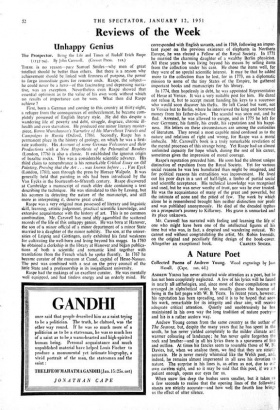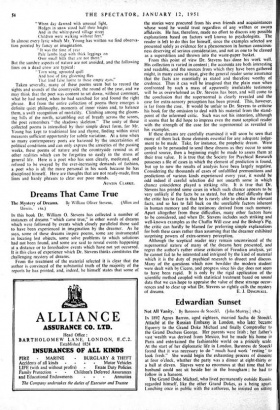A Nature Poet
Collected Poems of Andrew Young. Wood engravings by Joan Hassan. (Cape. los. 6d.)
ANDREW YOUNG has never attracted wide attention as a poet, but he has not been completely neglected. A.few of his lyrics will be found in nearly aH adthologies, and, since most of these compilations are arranged „in alphabetical order, he usually glares the honour of being in the last pages with W. B. Yeats. In recent years, however, his reputation has been spreading, and it is to be hoped that sool his work, remarkable for its integrity and clear aim, will receive adequate critical attention. Quietly and unobtrusively he has maintained In his own way the long tradition of nature poetry— and his is a rather austere way.
Andrew Young comes from the same country as the author of The Seasons, but, despite the many years that he has spent in the south, he has never yielded completely to the milder climate an.J warmer colouring of landscape ; he has never quite forgotten thz rock and heather—and in all his lyrics there is a sparseness of line and outline. At times his fancies seem to resemble those of W. 11. Davies, but, when we analyse them, we find that they are strictl accurate. He is never merely whimsical like the Welsh poet, atul, indeed, he remains almost impersonal in all save his devotion t3 nature. The surprise in his lines is, as -often as not, due to o:Ir own careless sight, and so it may be said that this poet, if we a-3 patient enough, opens our eyes for us.
When snow lies deep the bushes seem smaller, but it takes us a few seconds to realise that the opening lines of the followir; stanza are strictly accurate—and how well the fourth line bring, us the effect of utter silence.
"When day dawned with unusual light, Hedges in snow stood half their height And in the white-paved village street Children were walking without feet."
In almost every lyric which Mr. Young has written we find observa- tion pointed by fancy or imagination.
It was the time of year Pale lambs leap with thick leggings on Over small hills that are not there."
But the sombre aspects of nature are not avoided, and the following lines on a dead crow are typical: "Torn wing, uprooted quill And host of tiny glistening flies That lend false lustre to these empty eyes."
Taken severally, many of these poems seem but to record the sights and sounds of the countryside, the round of the year, and we may think that the poet was content to set down, without comment, what he had noted, when he had searched for and found the right phrase. But from the entire collection of poems there emerges a definite quiet philosophy, moments of inner vision and, to balance them, a swift recognition of mortality. Climbing among the gloom- ing hills of the north, scrambling out of breath across the screes, the poet remembers "the shadowy skeleton." The unity of these collected poems is intensified by their simple direct form, for Mr. Young has kept to traditional line and rhyme, finding within strict measures sufficient opportunity for subtle variation. At a time when so many contemporary poets are harassed by the uncertainties of political conditions and can only express the anxieties of the passing weeks, these poems of nature and the countryside remind us of other realities which can be forgotten so easily in the stress of general life. Here is a poet who has seen clearly, meditated, and refused to be swayed by the ever-increasing demands of fashion, a poet who is all the more personal in his work because he has disciplined himself. Here are thoughts that are not ready-made, firm lines and hardy phrases to clear our poor minds.
AUSTIN CLARKE.



































 Previous page
Previous page